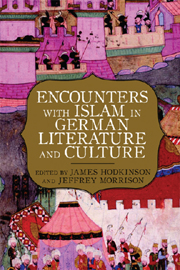Book contents
- Frontmatter
- Contents
- Acknowledgments
- Introduction
- 1 “cristen, ketzer, heiden, jüden”: Questions of Identity in the Middle Ages
- 2 Wolfram von Eschenbach, Islam, and the Crusades
- 3 Perverted Spaces: Boundary Negotiations in Early-Modern Turcica
- 4 Enlightenment Encounters the Islamic and Arabic Worlds: The German “Missing Link” in Said's Orientalist Narrative (Meiners and Herder)
- 5 Goethe, Islam, and the Orient: The Impetus for and Mode of Cultural Encounter in the West-östlicher Divan
- 6 Moving beyond the Binary? Christian-Islamic Encounters and Gender in the Thought and Literature of German Romanticism
- 7 Forms of Encounter with Islam around 1800: The Cases of Johann Hermann von Riedesel and Johann Ludwig Burckhardt
- 8 Displacing Orientalism: Ottoman Jihad, German Imperialism, and the Armenian Genocide
- 9 German-Islamic Literary Interperceptions in Works by Emily Ruete and Emine Sevgi Özdamar
- 10 Dialogues with Islam in the Writings of (Turkish-)German Intellectuals: A Historical Turn?
- 11 Michaela Mihriban Özelsel's Pilgrimage to Mecca: A Journey to Her Inner Self
- 12 Intimacies both Sacred and Profane: Islam in the Work of Emine Sevgi Özdamar, Zafer Şnocak, and Feridun Zaimoğlu
- 13 Encountering Islam at Its Roots: Ilija Trojanow's Zu den heiligen Quellen des Islam
- 14 The Lure of the Loser: On Hans Magnus Enzensberger's Schreckens Männer and Ian Buruma's Murder in Amsterdam
- Notes on the Contributors
- Index
7 - Forms of Encounter with Islam around 1800: The Cases of Johann Hermann von Riedesel and Johann Ludwig Burckhardt
Published online by Cambridge University Press: 05 February 2013
- Frontmatter
- Contents
- Acknowledgments
- Introduction
- 1 “cristen, ketzer, heiden, jüden”: Questions of Identity in the Middle Ages
- 2 Wolfram von Eschenbach, Islam, and the Crusades
- 3 Perverted Spaces: Boundary Negotiations in Early-Modern Turcica
- 4 Enlightenment Encounters the Islamic and Arabic Worlds: The German “Missing Link” in Said's Orientalist Narrative (Meiners and Herder)
- 5 Goethe, Islam, and the Orient: The Impetus for and Mode of Cultural Encounter in the West-östlicher Divan
- 6 Moving beyond the Binary? Christian-Islamic Encounters and Gender in the Thought and Literature of German Romanticism
- 7 Forms of Encounter with Islam around 1800: The Cases of Johann Hermann von Riedesel and Johann Ludwig Burckhardt
- 8 Displacing Orientalism: Ottoman Jihad, German Imperialism, and the Armenian Genocide
- 9 German-Islamic Literary Interperceptions in Works by Emily Ruete and Emine Sevgi Özdamar
- 10 Dialogues with Islam in the Writings of (Turkish-)German Intellectuals: A Historical Turn?
- 11 Michaela Mihriban Özelsel's Pilgrimage to Mecca: A Journey to Her Inner Self
- 12 Intimacies both Sacred and Profane: Islam in the Work of Emine Sevgi Özdamar, Zafer Şnocak, and Feridun Zaimoğlu
- 13 Encountering Islam at Its Roots: Ilija Trojanow's Zu den heiligen Quellen des Islam
- 14 The Lure of the Loser: On Hans Magnus Enzensberger's Schreckens Männer and Ian Buruma's Murder in Amsterdam
- Notes on the Contributors
- Index
Summary
IN THE CONTEXT OF A VOLUME CONCERNED WITH German encounters with Islamic culture it may seem bizarre to deal with two authors who write of or publish their travels in a language other than German. Clearly, many highly interesting authors have reported on their experience and interpretation of Islamic culture in German and might appear to be of more obvious interest to German scholars. However, the case will be made in this chapter that the two authors under discussion, namely the German travelogue writer Johann Hermann von Riedesel (1740–85) and the Swiss adventurer Johann Ludwig Burckhardt (1784–1817), are particularly revealing of a period of German/Swiss cultural development and that their travel accounts provide, alongside overt discussion of foreign cultures, testimony of the fragility of their own cultural positions. The discussion will begin with Riedesel's travel report, the Remarques d'un voyageur moderne au Levant of 1773, which appeared in translation as Bemerkungen auf einer Reise nach der der Levante in 1774 and in a new translation in 1940 as Randbemerkungen über eine Reise nach der Levante, 1768. The perceived significance of the text is reflected in the fact of its double translation — and indeed in the speed of the first translation — although this is rather at odds with the progressive downgrading of Riedesel's observations from a “modern traveler's notes” in the French edition to mere notes and then marginalia in the German versions.
- Type
- Chapter
- Information
- Encounters with Islam in German Literature and Culture , pp. 128 - 144Publisher: Boydell & BrewerPrint publication year: 2009

